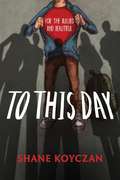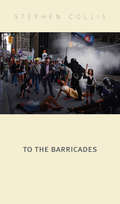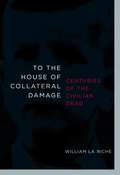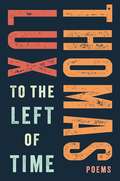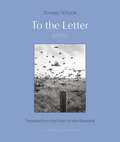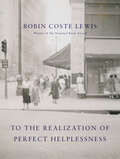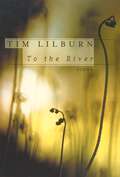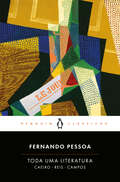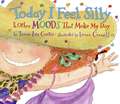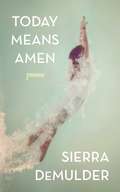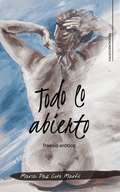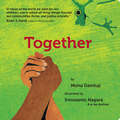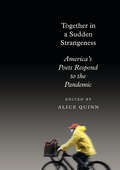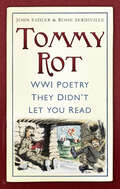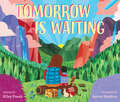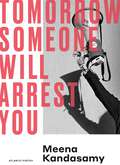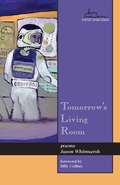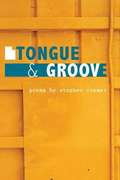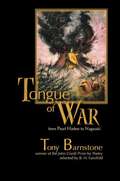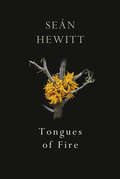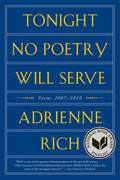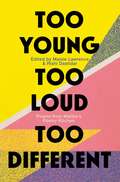- Table View
- List View
To This Day: For the Bullied and Beautiful
by Shane KoyczanAn authentic rallying cry for anyone who has been affected by bullying. <p><p> In February 2013, Shane Koyczan's passionate anti-bullying poem "To This Day" electrified the world. An animated video of the lyric narrative went viral, racking up over 12 million hits to date and inspiring an international movement against bullying in schools. Shane later performed the piece to sustained applause on the stage of the 2013 annual TED Conference. <p><p> Now this extraordinary work has been adapted into an equally moving and visually arresting book. Thirty international artists, as diverse as they are talented, have been inspired to create exceptional art to accompany "To This Day." Each page is a vibrant collage of images, colors and words that will resonate powerfully with anyone who has experienced bullying themselves, whether as a victim, observer, or participant. <p><p> Born of Shane's own experiences of being bullied as a child, To This Day expresses the profound and lasting effect of bullying on an individual, while affirming the strength and inner resources that allow people to move beyond the experience. A heartfelt preface and afterword, along with resources for kids affected by bullying, make this book an invaluable centerpiece of the anti-bullying movement. <p><p> See the video version of the poem on YouTube: www.youtube.com/watch?v=ltun92DfnPY
To the Barricades
by Stephen CollisTo the Barricades moves back and forth between historical and contemporary scenes of revolt, from nineteenth-century Parisian street barricades to twenty-first-century occupations and street marches, shifting along the active seam between poetry and revolution. Avant-garde technique is donated to lyric ends, forming an anti-archive of the revolutionary record where words are bricks hurriedly thrown up as linguistic "barricades."Stephen Collis is the author of five books of poetry, including the Dorothy Livesay Poetry Prize-winning On the Material and three titles in the ongoing "Barricades Project." An activist and social critic, his writing on the Occupy movement is collected in Dispatches from the Occupation (Talonbooks, 2012).
To the House of Collateral Damage: Centuries of the Civilian Dead
by William La RicheThis incredibly ambitious, book-length poem takes on the modern problem of war. The poem's great achievement is that it situates our own age, not as a golden age, but as one notable for its harshness and brutality, especially towards noncombatants, as well as for the beauty of the language that can be found to describe and understand that brutality, and perhaps to change it. Homer's Iliad and Virgil's Aeneid allow us, two and a half millennia later, to experience the complexity and contradictions of the ancient world. La Riche proposes, boldly, to observe and judge our own world through the contradictions of our relationship to war.
To the Left of Time
by Thomas LuxA brilliant new collection of poems by Kingsley Tufts Award-winning poet Thomas Lux With To the Left of Time, Thomas Lux adds more than fifty new poems to his celebrated oeuvre. Broken into three sections, these include semi-autobiographical poems, odes, and a final section that delves into a variety of subjects reflective of Lux's imaginative range. Full of his characteristic satire and humor, this new collection promises laughter and profound insight into the human condition. To the Left of Time is a powerful addition to the work of one who has been widely praised for his ability to offer image- and metaphor-driven visions as well as lines of plain language and immediacy. This collection proves that Lux's work will continue to inspire readers for decades to come.
To the Left of Time
by Thomas LuxA brilliant new collection of poems by Kingsley Tufts Award–winning poet Thomas Lux With To the Left of Time, Thomas Lux adds more than fifty new poems to his celebrated oeuvre. Broken into three sections, these include semi-autobiographical poems, odes, and a final section that delves into a variety of subjects reflective of Lux’s imaginative range. Full of his characteristic satire and humor, this new collection promises laughter and profound insight into the human condition. To the Left of Time is a powerful addition to the work of one who has been widely praised for his ability to offer image- and metaphor-driven visions as well as lines of plain language and immediacy. This collection proves that Lux’s work will continue to inspire readers for decades to come.
To the Letter: Poems
by Tomasz RozyckiFrank, acute, and intimate poems of human loss, resilience, and love – detective poem, historical hopscotch, love story &“A truly lyrical longing for the world to be transformed.&”—Polish Book InstituteRóżycki collects moments of illumination – a cat dashing out of a window and "feral sun" streaking in, a body planting itself in the ground like rhubarb and flowering. He collects and collects, opens a crack, and clutches a shrapnel of epiphany.Tomasz Różycki's To the Letter follows Lieutenant Anielewicz on the hunt for any clues that might lead 21st century human beings out of a sense of despair. With authoritarianism rising across Eastern Europe, the Lieutenant longs for a secret hero. At first, he suspects some hidden mechanism afoot: fruit tutors him in the ways of color, he drifts out to sea to study the grammar of tides, or he gazes at the sun as it thrums away like a timepiece. In one poem, he admits "this is the story of my confusion," and in the next the Lieutenant is back on the trail. "This lunacy needs a full investigation," he jibes.He wants to get to the bottom of it all, but he's often bewitched by letters and the trickery of language. Diacritics on Polish words form a "flock of sooty flecks, clinging to letters" and Lieutenant Anielewicz studies the tails, accents, and strokes that twist this script.While the Lieutenant can't write a coherent code to solve life's mysteries or to fill the absence of a country rent by war, his search for patterns throughout art, philosophy, and literature lead not to despair but to an affirmation of the importance of human love
To the Realization of Perfect Helplessness
by Robin Coste LewisA genre-bending exploration of poetry, photography, and human migration--another revelatory visual expedition from the National Book Award–winning poet who changed the way we see art, the museum, and the Black female figure.Twenty-five years ago, after her maternal grandmother&’s death, Robin Coste Lewis discovered a stunning collection of photographs in an old suitcase under her bed, filled with everything from sepia tintypes to Technicolor Polaroids. Lewis&’s family had survived one of the largest migrations in human history, when six million Americans fled the South, attempting to escape from white supremacy and white terrorism. But these photographs of daily twentieth-century Black life revealed a concealed, interior history. The poetry Lewis joins to these vivid images stands forth as an inspiring alternative to the usual ways we frame the old stories of &“race&” and &“migration,&” placing them within a much vaster span of time and history.In what she calls &“a film for the hands&” and &“an origin myth for the future,&” Lewis reverses our expectations of both poetry and photography: &“Black pages, black space, black time––the Big Black Bang.&” From glamorous outings to graduations, birth announcements, baseball leagues, and back-porch delight, Lewis creates a lyrical documentary about Black intimacy. Instead of colonial nostalgia, she offers us &“an exalted Black privacy.&” What emerges is a dynamic reframing of what it means to be human and alive, with Blackness at its center. &“I am trying / to make the gods / happy,&” she writes amid these portraits of her ancestors. &“I am trying to make the dead / clap and shout.&”
To the River
by Tim LilburnTo the River is a beautifully crafted gathering of poems. Turning and returning to the banks of the South Saskatchewan River, it is a compelling meditation conducted in the presence of a particular landscape. With great metaphorical muscle, the poems move towards the inhabitants of that riverscape, which remains rich with a sense of the strangeness inside the familiarity of willow, geese, river ice, coyote, snowberry. It is not just the satisfaction of aesthetic accomplishment which gives the book its compulsive energy, but the persistence of the seeker’s desire for what eludes even our strongest acts of language. Contemplative and spare, spiritual and sensual, To the River is a poetry of praise, a love poem to the earth, a prayer, and a journal of interior practice. It is a collection written by a poet moving into the full stretch of his power.
Toda uma literatura: Seleção de textos de Alberto Caeiro, Ricardo Reis e Álvaro de Campos
by Fernando Pessoa Nuno AmadoCom seleção, organização e introdução de Nuno Amado, Toda uma literatura expõe, através de poemas e prosa dos 3 grandes heterónimos, o verdadeira carater pragmático do projeto poético de Fernando Pessoa, revelando um poeta em reflexão sobre o sentido da própria poesia. «Porque o único sentido oculto das cousas É elas não terem sentido oculto nenhum.» Toda uma literatura explora a compreensão da génese de Álvaro de Campos, Ricardo Reis e Alberto Caeiro radicando-a numa profunda intencionalidade. Uma exposição da heteronímia, dos poemas à prosa, que revela um poeta ocupado com a criação de um mundo, preocupado com a construção de um programa estético, debruçado sobre o sentido da própria poesia. Este é um trabalho desassombrado e fecundo que resgata a heteronímia pessoana aos lugares-comuns e lhe devolve a sua fenomenologia, o seu verdadeiro caráter programático, e o enquadra no projetopoético que sempre foi e para o qual Fernando Pessoa tudo fez concorrer. Introdução, seleção, organização e notas de Nuno Amado
Today I Feel Silly and Other Moods That Make My Day
by Jamie Lee CurtisA child's moods range from silliness to anger to excitement, coloring and changing every day.
Today Means Amen
by Sierra DeMulder<P>Dear you: <P>Whoever you are, <P>However you got here, <P>This is exactly where you are supposed to be. <P>This moment has waited its whole life for you. <P>These are the opening lines of "Today Means Amen," YouTube star Sierra deMulder’s immensely powerful and virally popular poem, which lends its title to this collection. Like her fellow Millennial poets Tyler Knot Gregson, Clementine von Radics, and Lang Leav, Sierra has the gift of speaking directly to the reader. “Today Means Amen” has become an anthem of sorts to thousands, who find themselves reflected in its pain, its fierceness, its tenderness — but also in its triumphant culminating refrain: <P> You made it <P>You made it <P>You made it <P>Here. <P>The poems in Sierra's new book explore the rocky terrains of love, family, and womanhood with this same remarkable honesty and generosity. Today Means Amen brings this important young poet's work to an even broader audience.
Todo lo abierto: Poesía erótica
by María Paz Cots Marfil...entre lo que va y viene de la piel a su sexto sentido. Ese todo lo abierto que se abre.Esa piel crecida.Esa conquista radiante.Esa tierra de nadie.Esa duración del mar.Esa agonía de olas.Ese abismo de ropa acelerada.Esa ausencia rendida ante las ganas.Ese olvido de sabernos.Esa parcela en la carne.Ese sexo en que somos.Ese todo lo abierto que se abre.Esa piel crecida.Esa tierra de nadie.Esa sombra que sospecha un solo cuerpo.Ese tiempo que nos pierde las horas.Ese beso que derrota las líneas.Ese aliento llovido que no habla.Esos nudos de silencios caladosy de venas empapadas.Subterráneos hacia arriba.
Together
by Asma El FerkoussTaking the time to put words into what is going on inside is to honor your feelings by giving them life and allowing them to exist. This collection of poems allows you to travel in a universe where expressions communicate in a subtle way to share a smooth fragrance of love and pleasure
Together
by Mona DamlujiA breathtakingly simple poem of universal experience shows us the transformative power of collective action."Together offers a vision of the world we want for our children, one in which all living things flourish, our communities thrive, and justice prevails.&” --Ibram X. Kendi, author of Antiracist BabyIn Together, social justice kids book pioneer Innosanto Nagara teams up with poet and activist Mona Damluji for a stunningly tender and pitch-perfect visual feast that juxtaposes individual action with the power of people acting together. Each of the ten free-verse couplets in the poem is spread across four pages of imagery, to make a unique and different kind of board book for young kids to discover with their families.The first illustrated book in which Nagara applies his extraordinary visual imagination to words not his own, Together is simplicity itself--a poem about the transformational change that happens when people stop acting alone and start doing things together. Together is Nagara's third board book, following the immensely popular social justice board books A is for Activist and Counting on Community.
Together in a Sudden Strangeness: America's Poets Respond to the Pandemic
by Edited by Alice QuinnIn this urgent outpouring of American voices, our poets speak to us as they shelter in place, addressing our collective fear, grief, and hope from eloquent and diverse individual perspectives.As the novel coronavirus and its devastating effects began to spread in the United States and around the world, Alice Quinn reached out to poets across the country to see if, and what, they were writing under quarantine. Overwhelmed by the response, the onetime New Yorker poetry editor and recent former director of the Poetry Society of America began collecting the compassionate verses that were arriving in her inbox, assembling this various, intimate, and intricate portrait of our suddenly altered reality. Whether grieving for relatives they are separated from, recovering from illness themselves, attending to suddenly complicated household tasks, or considering the bravery of medical workers and the inequities in our society that amplify sorrow and demand our engagement, our poets are just like us, but with the words to describe what can feel unspeakably difficult and strange. From fierce and resilient to wistful, darkly humorous, and emblematically reverent about the earth and the vulnerability of human beings in frightening times, the poems in this collection provide wisdom and companionship, depths of feeling that enliven our spirits, and a poignant summoning to the page of spring's inevitable return.
Tommy Rot: WWI Poetry They Didn't Let You Read
by John Sadler Rosie SerdivilleThe Great War 1914-1918 was dubbed the ‘war to end all wars’ and introduced the full flowering of industrial warfare to the world. The huge enthusiasm which had greeted the outbreak of hostilities in August 1914 soon gave way to a grim resignation and, as the Western Front became a long, agonising battle of dire attrition, revulsion. Never before had England’s sons and daughters poured out their lifeblood in such prolonged and seemingly incessant slaughter. The conflict produced a large corpus of war poetry, though focus to date has rested with the ‘big’ names - Brooke, Sassoon, Graves, Owen, Rosenberg and Blunden et al – with their descent from youthful enthusiasm to black cynicism held as a mirror of the nation’s journey. Their fame is richly merited, but there are others that, until now, you would not expect to find in any Great War anthology. This is ‘Tommy’ verse, mainly written by other ranks and not, as is generally the case with the more famous war poets, by officers. It is, much of it, doggerel, loaded with lavatorial humour. Much of the earlier material is as patriotic and sentimental as the times, jingoistic and occasionally mawkish. However, the majority of the poems in this collection have never appeared in print before; they have been unearthed in archives, private collections and papers. Their authors had few pretences, did not see themselves as poets, nor were writing for fame and posterity. Nonetheless, these lost voices of the Great War have a raw immediacy, and an instant connection that the reader will find compelling.
Tomorrow Is Waiting
by Kiley FrankA touching, timeless book about a parent's everlasting love for their child--and all of the potential their child has within.Tonight as you sleepA new day stirsEach kiss goodnightIs a wish for tomorrow...As a child dreams, their parent imagines everything they will someday be: independent and imaginative, kind and courageous, a listener and a leader. And each hopeful, heartfelt wish is paired with a a promise of love.Tender and moving, Tomorrow Is Waiting is a modern celebration of the dreams we have for our children for finding their place in the world, and for how they will make it a better world. A perfect gift for baby showers, birthdays, and graduation, it's a book that will be treasured, passed down, read and loved--again, and again, and again.
Tomorrow Someone Will Arrest You
by Meena KandasamyA fierce, tender, political collection that asks how to express the fullness of identity and desire in the face of a hostile state.All disciplinea deception to hide the wildness, all symmetryan excuse for keeping count. Tomorrow Someone Will Arrest You cements Meena Kandasamy as one of the most exciting, radical thinkers at work today. These poems chronicle wanting, art-making, and the practising of resistance and solidarity in the face of a hostile state. Here, the personal is political, and Kandasamy moves between sex, desire, family and wider societal issues of caste, the refugee crisis, and freedom of expression with grace and defiance. This is a bold, unforgettable collection by a poet who compels us to sit up and listen.
Tomorrow's Living Room (Swenson Poetry Award #13)
by Jason WhitmarshVolume 13 in the Swenson Award Series, Tomorrow's Living Room offers a pleasantly disorienting verbal territory. The collection is alternately wry and dark, hopeful and bleak, full of unexpected light and laugh-out-loud incongruities. We begin to see that the shape and the furniture of Jason Whitmarsh's world reflect our own (they may in fact be universal), but we're considering them through completely new terms of engagement. Selected by, and with a foreword by, Billy Collins. The annual Swenson competition, named for May Swenson, honors her as one of America’s most provocative and vital writers. In John Hollander’s words, she was "one of our few unquestionably major poets."
Tongue & Groove
by Stephen CramerInspired and informed by the music and urban landscape of New York City, Tongue & Groove employs jazzy and descriptive language in a sweep of city-life experiences and memories. A passionate rendering of incidents in spaces that include the subway, a school for the handicapped, and The Museum of Modern Art, Stephen Cramer employs richly sensual language and a wide range of imagery. Alluring portrayals of butterfly migrations, graffiti, and city buses complement this collection's connection to the everyday hoots, shouts, and yammer of the streets. --or you can open your mouth & stick out your tongue, take that fugitive impulse from the artist's hand straight into your very gut & maybe find out along the way if the lime-green of that inverted roof & the burnt almond of the filling station's roadside grasses live up to their names. --from "Taste"
Tongue of War: From Pearl Harbor to Nagasaki
by Tony BarnstoneThese poems, many written in forms such as the sonnet, are inspired by historical situations and accounts--letters, oral histories, news reports, etc.--of individuals from both sides of the Pacific theater of World War II, including the home fronts.
Tongues of Fire
by Seán Hewitt** WINNER OF THE LAUREL PRIZE 2021 ****A SPECTATOR AND IRISH TIMES BOOK OF THE YEAR 2020****SHORTLISTED FOR THE SUNDAY TIMES / UNIVERSITY OF WARWICK YOUNG WRITER OF THE YEAR AWARD 2020****SHORTLISTED FOR THE JOHN POLLARD FOUNDATION INTERNATIONAL POETRY PRIZE 2021****SHORTLISTED FOR THE DALKEY LITERARY EMERGING WRITER OF THE YEAR AWARD 2021**A remarkable first collection by an important new poetIn this collection, Seán Hewitt gives us poems of a rare musicality and grace. By turns searing and meditative, these are lyrics concerned with the matter of the world, its physicality, but also attuned to the proximity of each moment, each thing, to the spiritual. Here, there is sex, grief, and loss, but also a committed dedication to life, hope and renewal. Drawing on the religious, the sacred and the profane, this is a collection in which men meet in the woods, where matter is corrupted and remade. There are prayers, hymns, vespers, incantations, and longer poems which attempt to propel themselves towards the transcendent. In this book, there is always the sense of fragility allied with strength, a violence harnessed and unleashed. The collection ends with a series of elegies for the poet's father: in the face of despair, we are met with a fierce brightness, and a reclamation of the spiritual. 'This is when / we make God, and speak in his voice.'Paying close attention to altered states and the consolations and strangeness of the natural world, this is the first book from a major poet.
Tonight No Poetry Will Serve: Poems 2007-2010
by Adrienne RichRelationships--partings/reconciliations, solidarities/ruptures, trust/betrayal, exposure/withdrawal--are the deep fabric of this forceful work. In the intimate address of "Axel Avákar," the black humor of "Quarto," and the underground journey of "Powers of Recuperation," compressed lyrics flash among larger scenarios where images, dialogues, blues, and song spiral into political visions. Adrienne Rich has said, "I believe almost everything I know, have come to understand, is somewhere in this book." from "Ballade of the Poverties" There's the poverty of wages wired for the funeral you Can't get to the poverty of bodies lying unburied There's the poverty of labor offered silently on the curb The poverty of yard sale scrapings spread And rejected the poverty of eviction, wedding bed out on street Prince let me tell you who will never learn through words There are poverties and there are poverties.
Tonight at Nine
by JanoschWhat do the animals do all day? Practice the instruments they must play, So children 'round the world will know: Night has come; to bed they must go. A clever bedtime story told in rhyme.
Too Young, Too Loud, Too Different: Poems from Malika's Poetry Kitchen
by Malika's Poetry Kitchen'We knew that black and brown bodies, working class voices, women's voices, did not have a space where they could be heard - and so this writing collective was a necessary and political act'In the early years of the new millennium, poets Malika Booker and Roger Robinson saw the need for a space for writers outside of the establishment to grow, improve, discuss and learn. One Friday night, Malika offered her Brixton kitchen table as a meeting place. And so Malika's Poetry Kitchen was born.'Kitchen', as it became known, has ushered in a new generation of voices, launching some of the most exciting writers, books and initiatives in British poetry in the past twenty years. Today, Kitchen is a thriving writers' collective, with a wealth of talented poets and branches in Chicago and India.Too Young, Too Loud, Too Different is a celebration of Kitchen's legacy, an appreciation of its foundational spirit and a rallying cry for all writers to dream the future. The collection features breathtaking new poems by Warsan Shire, Inua Ellams, Kayo Chingonyi, Dean Atta, Roger Robinson, Malika Booker among many others.
